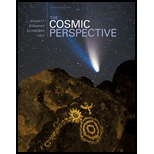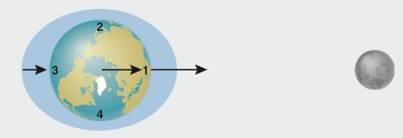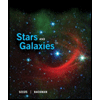
The Cosmic Perspective
7th Edition
ISBN: 9780321839558
Author: Jeffrey O. Bennett, Megan O. Donahue, Nicholas Schneider, Mark Voit
Publisher: Addison-Wesley
expand_more
expand_more
format_list_bulleted
Textbook Question
Chapter 4, Problem 2VSC
Use the following questions to check your understanding of some of the many types of visual information used in astronomy. For additional practice, try the Chapter 4 Visual Quiz at MasteringAsrrononry®.

The figure above, based on figure 4.24, shows how the Moon causes tides on Earth. Note that the North Pole is in the center of the diagram, so the numbers 1 through 4 label points along Earth's equator.
2. Where is it high tide?
a. point 1 only
b. point 2 only
c. points 1 and 3
d. points 2 and 4
Expert Solution & Answer
Want to see the full answer?
Check out a sample textbook solution
Students have asked these similar questions
Calculate the center of mass of the hollow cone
shown below. Clearly specify the origin and the
coordinate system you are using.
Z
r
Y
h
X
12. If all three collisions in the figure below are
totally inelastic, which will cause more damage?
(think about which collision has a larger amount of
kinetic energy dissipated/lost to the environment?
I
m
II
III
A. I
B. II
C. III
m
m
v
brick wall
ע
ע
0.5v
2v
0.5m
D. I and II
E. II and III
F. I and III
G. I, II and III (all of them)
2m
Can you solve this 2 question teach me step by step and draw for me
Chapter 4 Solutions
The Cosmic Perspective
Ch. 4 - Prob. 1VSCCh. 4 - Use the following questions to check your...Ch. 4 - Use the following questions to check your...Ch. 4 - Use the following questions to check your...Ch. 4 - Use the following questions to check your...Ch. 4 - Define speed, velocity, and acceleration. What are...Ch. 4 - Define momentum and force. What do we mean when we...Ch. 4 - What is free-fall, and why does it make you...Ch. 4 - Prob. 4EAPCh. 4 - Describe the laws of conservation of momentum, of...
Ch. 4 - Define kinetic energy, radiative energy, and...Ch. 4 - Define temperature and thermal energy. How are...Ch. 4 - Prob. 8EAPCh. 4 - 9. Summarize the universal law of gravitation both...Ch. 4 - 10. What is the difference between a bound and an...Ch. 4 - What do we need to know if we want to measure an...Ch. 4 - Explain why orbits cannot change spontaneously,...Ch. 4 - Explain how the Moon creates tides on Earth. Why...Ch. 4 - What is tidal friction? What effects does it have...Ch. 4 - Does It Make Sense?
Decide whether the statement...Ch. 4 - Does It Make Sense?
Decide whether the statement...Ch. 4 - Does It Make Sense?
Decide whether the statement...Ch. 4 - Does It Make Sense?
Decide whether the statement...Ch. 4 - Prob. 19EAPCh. 4 - Prob. 20EAPCh. 4 - Does It Make Sense? Decide whether the statement...Ch. 4 - Does It Make Sense?
Decide whether the statement...Ch. 4 - Does It Make Sense?
Decide whether the statement...Ch. 4 - Does It Make Sense?
Decide whether the statement...Ch. 4 - Choose the best answer to each of the following....Ch. 4 - Choose the best answer to each of the following....Ch. 4 - Choose the best answer to each of the following....Ch. 4 - Choose the best answer to each of the following....Ch. 4 - Choose the best answer to each of the following....Ch. 4 - Prob. 30EAPCh. 4 - Prob. 31EAPCh. 4 - Choose the best answer to each of the following....Ch. 4 - Choose the best answer to each of the following....Ch. 4 - Choose the best answer to each of the following....Ch. 4 - Testing Gravity. Scientists are continually trying...Ch. 4 - Prob. 36EAPCh. 4 - Prob. 37EAPCh. 4 - Prob. 38EAPCh. 4 - Gravitational Potential Energy. For each of the...Ch. 4 - Prob. 40EAPCh. 4 - Prob. 41EAPCh. 4 - Prob. 42EAPCh. 4 - Prob. 43EAPCh. 4 - Prob. 44EAPCh. 4 - Geostationary Orbit. A satellite in geostationary...Ch. 4 - Prob. 46EAPCh. 4 - Prob. 47EAPCh. 4 - Prob. 48EAPCh. 4 - Prob. 49EAPCh. 4 - Prob. 50EAPCh. 4 - Prob. 51EAPCh. 4 - Prob. 52EAPCh. 4 - Prob. 53EAPCh. 4 - Prob. 54EAPCh. 4 - Prob. 55EAPCh. 4 - Prob. 56EAPCh. 4 - Prob. 57EAPCh. 4 - Prob. 58EAPCh. 4 - Prob. 59EAPCh. 4 - Prob. 60EAPCh. 4 - Prob. 61EAP
Knowledge Booster
Learn more about
Need a deep-dive on the concept behind this application? Look no further. Learn more about this topic, physics and related others by exploring similar questions and additional content below.Similar questions
- From this question and answer can you explain how get (0,0,5) and (5,0,,0) and can you teach me how to solve thisarrow_forwardCan you solve this 2 question and teach me using ( engineer method formula)arrow_forward11. If all three collisions in the figure below are totally inelastic, which brings the car of mass (m) on the left to a halt? I m II III m m ע ע ע brick wall 0.5v 2m 2v 0.5m A. I B. II C. III D. I and II E. II and III F. I and III G. I, II and III (all of them)arrow_forward
- How can you tell which vowel is being produced here ( “ee,” “ah,” or “oo”)? Also, how would you be able to tell for the other vowels?arrow_forwardYou want to fabricate a soft microfluidic chip like the one below. How would you go about fabricating this chip knowing that you are targeting a channel with a square cross-sectional profile of 200 μm by 200 μm. What materials and steps would you use and why? Disregard the process to form the inlet and outlet. Square Cross Sectionarrow_forward1. What are the key steps involved in the fabrication of a semiconductor device. 2. You are hired by a chip manufacturing company, and you are asked to prepare a silicon wafer with the pattern below. Describe the process you would use. High Aspect Ratio Trenches Undoped Si Wafer P-doped Si 3. You would like to deposit material within a high aspect ratio trench. What approach would you use and why? 4. A person is setting up a small clean room space to carry out an outreach activity to educate high school students about patterning using photolithography. They obtained a positive photoresist, a used spin coater, a high energy light lamp for exposure and ordered a plastic transparency mask with a pattern on it to reduce cost. Upon trying this set up multiple times they find that the full resist gets developed, and they are unable to transfer the pattern onto the resist. Help them troubleshoot and find out why pattern of transfer has not been successful. 5. You are given a composite…arrow_forward
- Two complex values are z1=8 + 8i, z2=15 + 7 i. z1∗ and z2∗ are the complex conjugate values. Any complex value can be expessed in the form of a+bi=reiθ. Find r and θ for (z1-z∗2)/z1+z2∗. Find r and θ for (z1−z2∗)z1z2∗ Please show all stepsarrow_forwardAn electromagnetic wave is traveling through vacuum in the positive x direction. Its electric field vector is given by E=E0sin(kx−ωt)j^,where j^ is the unit vector in the y direction. If B0 is the amplitude of the magnetic field vector, find the complete expression for the magnetic field vector B→ of the wave. What is the Poynting vector S(x,t), that is, the power per unit area associated with the electromagnetic wave described in the problem introduction? Give your answer in terms of some or all of the variables E0, B0, k, x, ω, t, and μ0. Specify the direction of the Poynting vector using the unit vectors i^, j^, and k^ as appropriate. Please explain all stepsarrow_forwardAnother worker is performing a task with an RWL of only 9 kg and is lifting 18 kg, giving him an LI of 2.0 (high risk). Questions:What is the primary issue according to NIOSH?Name two factors of the RWL that could be improved to reduce risk.If the horizontal distance is reduced from 50 cm to 30 cm, how does the HM change and what effect would it have?arrow_forward
- Two complex values are z1=8 + 8i, z2=15 + 7 i. z1∗ and z2∗ are the complex conjugate values. Any complex value can be expessed in the form of a+bi=reiθ. Find r and θ for z1z2∗. Find r and θ for z1/z2∗? Find r and θ for (z1−z2)∗/z1+z2∗. Find r and θ for (z1−z2)∗/z1z2∗ Please explain all steps, Thank youarrow_forwardAn ac series circuit consists of a voltage source of frequency 60 Hz and voltage amplitude V, a 505-Ω resistor, and a capacitor of capacitance 7.2 μF. What must be the source voltage amplitude V for the average electrical power consumed in the resistor to be 236 W? There is no inductance in the circuit.arrow_forwardAn L−R−C series circuit has R= 280 Ω . At the frequency of the source, the inductor has reactance XLL= 905 Ω and the capacitor has reactance XC= 485 Ω . The amplitude of the voltage across the inductor is 445 V . What is the amplitude of the voltage across the resistor and the capacitor? What is the voltage amplitude of the source? What is the rate at which the source is delivering electrical energy to the circuit?arrow_forward
arrow_back_ios
SEE MORE QUESTIONS
arrow_forward_ios
Recommended textbooks for you
 Foundations of Astronomy (MindTap Course List)PhysicsISBN:9781337399920Author:Michael A. Seeds, Dana BackmanPublisher:Cengage Learning
Foundations of Astronomy (MindTap Course List)PhysicsISBN:9781337399920Author:Michael A. Seeds, Dana BackmanPublisher:Cengage Learning Stars and Galaxies (MindTap Course List)PhysicsISBN:9781337399944Author:Michael A. SeedsPublisher:Cengage Learning
Stars and Galaxies (MindTap Course List)PhysicsISBN:9781337399944Author:Michael A. SeedsPublisher:Cengage Learning

 Stars and GalaxiesPhysicsISBN:9781305120785Author:Michael A. Seeds, Dana BackmanPublisher:Cengage Learning
Stars and GalaxiesPhysicsISBN:9781305120785Author:Michael A. Seeds, Dana BackmanPublisher:Cengage Learning Glencoe Physics: Principles and Problems, Student...PhysicsISBN:9780078807213Author:Paul W. ZitzewitzPublisher:Glencoe/McGraw-Hill
Glencoe Physics: Principles and Problems, Student...PhysicsISBN:9780078807213Author:Paul W. ZitzewitzPublisher:Glencoe/McGraw-Hill

Foundations of Astronomy (MindTap Course List)
Physics
ISBN:9781337399920
Author:Michael A. Seeds, Dana Backman
Publisher:Cengage Learning

Stars and Galaxies (MindTap Course List)
Physics
ISBN:9781337399944
Author:Michael A. Seeds
Publisher:Cengage Learning



Stars and Galaxies
Physics
ISBN:9781305120785
Author:Michael A. Seeds, Dana Backman
Publisher:Cengage Learning

Glencoe Physics: Principles and Problems, Student...
Physics
ISBN:9780078807213
Author:Paul W. Zitzewitz
Publisher:Glencoe/McGraw-Hill
Time Dilation - Einstein's Theory Of Relativity Explained!; Author: Science ABC;https://www.youtube.com/watch?v=yuD34tEpRFw;License: Standard YouTube License, CC-BY